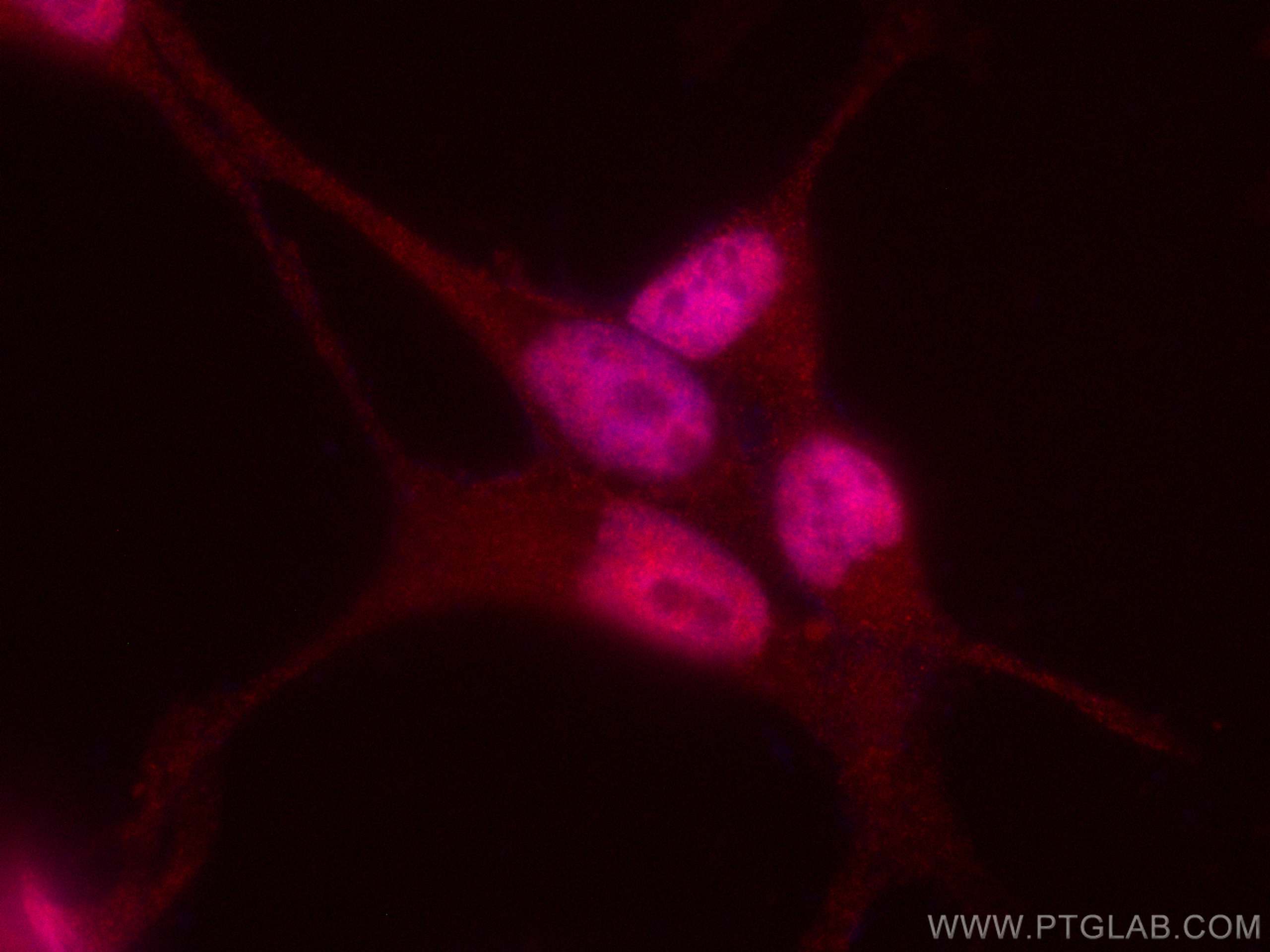AR Monoklonaler Antikörper
AR Monoklonal Antikörper für IF
Wirt / Isotyp
Maus / IgG2a
Getestete Reaktivität
human
Anwendung
IF
Konjugation
CoraLite®594 Fluorescent Dye
CloneNo.
1F7C12
Kat-Nr. : CL594-66747
Synonyme
Galerie der Validierungsdaten
Geprüfte Anwendungen
| Erfolgreiche Detektion in IF | LNCaP-Zellen |
Empfohlene Verdünnung
| Anwendung | Verdünnung |
|---|---|
| Immunfluoreszenz (IF) | IF : 1:50-1:500 |
| It is recommended that this reagent should be titrated in each testing system to obtain optimal results. | |
| Sample-dependent, check data in validation data gallery | |
Produktinformation
CL594-66747 bindet in IF AR und zeigt Reaktivität mit human
| Getestete Reaktivität | human |
| Wirt / Isotyp | Maus / IgG2a |
| Klonalität | Monoklonal |
| Typ | Antikörper |
| Immunogen | AR fusion protein Ag17291 |
| Vollständiger Name | androgen receptor |
| Berechnetes Molekulargewicht | 914 aa, 99 kDa |
| Beobachtetes Molekulargewicht | 110-120 kDa |
| GenBank-Zugangsnummer | BC132975 |
| Gene symbol | AR |
| Gene ID (NCBI) | 367 |
| Konjugation | CoraLite®594 Fluorescent Dye |
| Excitation/Emission maxima wavelengths | 588 nm / 604 nm |
| Form | Liquid |
| Reinigungsmethode | Protein-A-Reinigung |
| Lagerungspuffer | BS mit 50% Glyzerin, 0,05% Proclin300, 0,5% BSA, pH 7,3. |
| Lagerungsbedingungen | Bei -20°C lagern. Vor Licht schützen. Nach dem Versand ein Jahr stabil. Aliquotieren ist bei -20oC Lagerung nicht notwendig. 20ul Größen enthalten 0,1% BSA. |
Hintergrundinformationen
AR, also named as DHTR and NR3C4, belongs to the nuclear hormone receptor family and NR3 subfamily. AR is a ligand-activated transcription factors that regulate eukaryotic gene expression and affect cellular proliferation and differentiation in target tissues. Transcription factor activity is modulated by bound coactivator and corepressor proteins. AR is activated, but not phosphorylated, by HIPK3. Defects in AR are the cause of androgen insensitivity syndrome (AIS), previously known as testicular feminization syndrome (TFM), which is an X-linked recessive form of pseudohermaphroditism due end-organ resistance to androgen. Defects in AR are the cause of spinal and bulbar muscular atrophy X-linked type 1 (SMAX1) which also known as Kennedy disease. Defects in AR may play a role in metastatic prostate cancer. Defects in AR are the cause of androgen insensitivity syndrome partial (PAIS) which also known as Reifenstein syndrome. AR exists various isoforms with MV 110-120 kDa and 75-80 kDa. (PMID: 19244107 )
Protokolle
| Produktspezifische Protokolle | |
|---|---|
| IF protocol for CL594 AR antibody CL594-66747 | Protokoll herunterladen |
| Standard-Protokolle | |
|---|---|
| Klicken Sie hier, um unsere Standardprotokolle anzuzeigen |


